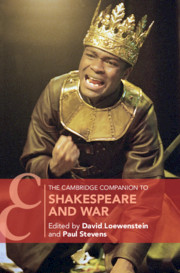Book contents
- The Cambridge Companion to Shakespeare and War
- The Cambridge Companion to Shakespeare and War
- Copyright page
- Dedication
- Contents
- Figures
- Contributors
- Preface
- Acknowledgments
- 1 Beyond Shallow and Silence
- 2 Just War Theory and Shakespeare
- 3 Shakespeare on Civil and Dynastic Wars
- 4 Foreign War
- 5 War and the Classical World
- 6 “The Question of These Wars”
- 7 Instrumentalizing Anger
- 8 War and Eros
- 9 Shakespeare’s Language and the Rhetoric of War
- 10 Staging Shakespeare’s Wars in the Twentieth and Twenty-First Centuries
- 11 Reading Shakespeare’s Wars on Film
- 12 Shakespeare and World War II
- 13 Henry V and the Pleasures of War
- 14 Macbeth and Trauma
- 15 Coriolanus and the Use of Power
- Index
- References
8 - War and Eros
Published online by Cambridge University Press: 17 August 2021
- The Cambridge Companion to Shakespeare and War
- The Cambridge Companion to Shakespeare and War
- Copyright page
- Dedication
- Contents
- Figures
- Contributors
- Preface
- Acknowledgments
- 1 Beyond Shallow and Silence
- 2 Just War Theory and Shakespeare
- 3 Shakespeare on Civil and Dynastic Wars
- 4 Foreign War
- 5 War and the Classical World
- 6 “The Question of These Wars”
- 7 Instrumentalizing Anger
- 8 War and Eros
- 9 Shakespeare’s Language and the Rhetoric of War
- 10 Staging Shakespeare’s Wars in the Twentieth and Twenty-First Centuries
- 11 Reading Shakespeare’s Wars on Film
- 12 Shakespeare and World War II
- 13 Henry V and the Pleasures of War
- 14 Macbeth and Trauma
- 15 Coriolanus and the Use of Power
- Index
- References
Summary
It is striking how many of Shakespeare’s erotic plays have war either as their setting or are born out of a recent state of violent conflict. Troilus and Cressida and Antony and Cleopatra fall most clearly into the former camp, but think also of comedies like Much Ado About Nothing and A Midsummer Night’s Dream, where eros emerges from a newly forged peace only to constitute a new battleground of its own. This chapter probes the conjunction of war and eros that appears in almost half of Shakespeare’s plays, first through a broad survey of his corpus and then through studies of The Two Noble Kinsmen, Troilus and Cressida, and Romeo and Juliet. It argues that, far from merely contingent, theatrical conjunctions, Shakespeare provides us a deep conceptual study of the connection between eros and violence, both the potential violence of sexuality and the unsettling underlying sexuality of war.
Keywords
- Type
- Chapter
- Information
- The Cambridge Companion to Shakespeare and War , pp. 128 - 144Publisher: Cambridge University PressPrint publication year: 2021



